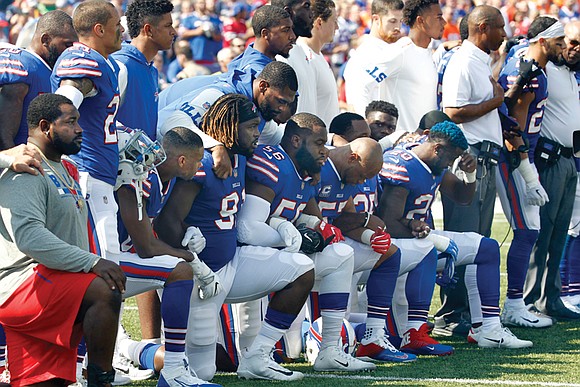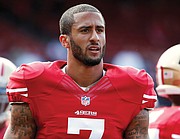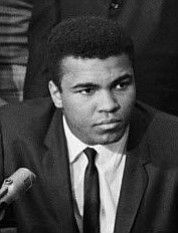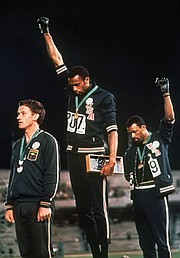Trump creates firestorm over athletes’ taking a knee
9/29/2017, 7:20 a.m.

President Trump seems to have too little to do.
Amid the damage from two hurricanes, a verbal feud with a nuclear North Korea and a host of other issues ranging from health care to tax reform, the president has triggered a spat with athletes in the nation’s most popular pro sports leagues, the NFL and the NBA.
And he’s not getting much respect — at least from the athletes he spent the weekend savaging — for triggering a fresh debate over race, justice and free speech.
The spat began last Friday at a political rally in Alabama, where the president raged to an overwhelming white conservative crowd that any NFL player taking a knee in protest during the national anthem was an S.O.B. who should be fired.
“Wouldn’t you love to see one of these NFL owners, when somebody disrespects our flag, to say, ‘Get that son of a bitch off the field right now ... He is fired,’ ” President Trump said at the rally for Republican U.S. Senate candidate Luther Strange of Alabama.
By Sunday, President Trump doubled down, saying through Twitter, “If NFL fans refuse to go to games until players stop disrespecting our Flag & Country, you will see change take place fast.”
In a second tweet, he wrote that the “league should back” fans who are upset about the protests.
The president’s remarks touched off protests by dozens of NFL players, coaches and even some owners at games on Sunday and Monday, along with criticism from many corners of the sports world.
There were scenes of players kneeling with arms locked on the field and of teams staying in locker rooms during the playing of national anthem. The reaction also included an array of disapproving comments, including from NFL owners who know President Trump and had generously supported his 2016 presidential campaign.
NFL Commissioner Roger Goodell rejected the president’s remarks as “divisive” and showing “an unfortunate lack of respect for the NFL, our great game and all of our players.”
“The childishness, the gratuitous fear-mongering and race baiting has become so consistent that we almost expect it, the bar has been lowered so far,” Gregg Popovich, head coach of the San Antonio Spurs basketball team, told reporters in summing up a widespread view.
The president piled on by rescinding the customary White House invitation to the Golden State Warriors, the NBA champions, after their top star, Steph Curry, said he would not attend.
President Trump’s action drew scorn from the likes of LeBron James, regarded as the world’s best basketball player. Hitting back at the president’s slew of comments on pro athletes from the NFL and NBA, Mr. James said, “The people run the country, not one individual, and damn sure not him.”
Mr. James, a player for the Cleveland Cavaliers who has visited the White House in the past after winning an NBA championship, also told reporters that “going to the White House was a great honor until” President Trump took office.
A new poll suggests President Trump and his caustic scolding of athletes — many of whom are African-American — does not sit will with a majority of Americans, including sports fans.
The poll found 57 percent of adults, including sports fans who watch NFL games, do not support the president’s call for protesting players to be fired.
Several political analysts suggested President Trump’s latest actions were designed as a diversion. He has a record of targeting racial and cultural divisions to distract from his policy agenda or from problems he’d prefer the news media not cover. His weekend tweets drew attention away from a flagging effort by Senate Republicans to repeal the Affordable Care Act, or Obamacare, which would have hurt millions of people.
Whatever the reason, the president spurred a renewal of interest in athletes’ protests, which New Jersey Sen. Cory Booker described as “a noble tradition” involving such notable figures as the late boxing great Muhammad Ali, who opposed the draft during the Vietnam War.
It also called up remembrances of Olympians Tommie Smith and John Carlos who raised their fists in the day’s black power salute as the national anthem was played during their medal ceremony at the 1968 Summer Olympics in Mexico City.
The latest burst of protests goes back to 2016, when San Francisco 49ers quarterback Colin Kaepernick stirred a national debate after refusing to stand during pre-game renditions of “The Star-Spangled Banner.”
Instead, Mr. Kaepernick dropped to one knee to protest against police violence against African-Americans.
Mr. Kaepernick, who is now a free agent, has not been signed to a team this season.
Benjamin T. Jealous, former president of the national NAACP and now running for governor of Maryland as a Democrat, said the president’s attacks had forced a more forthright reckoning of the rights of athletes to speak their minds.
“He ultimately challenged each of us to stand up and be very clear about what our flag stands for and what we believe,” Mr. Jealous said.
The Rev. Jesse L. Jackson Sr. said President Trump effectively challenged athletes of all races to protest.
“They should all kneel, not against the flag, but against the interference by Mr. Trump with their First Amendment rights,” Rev. Jackson said, urging players not to underestimate their power.
Admired athletes like Mr. Curry and Mr. James can take on the president through their vast audience of followers on personal social media sites. Unlike sports media figures of the past, they can communicate with hundreds of thousands of people directly, bypassing team owners and the media.









